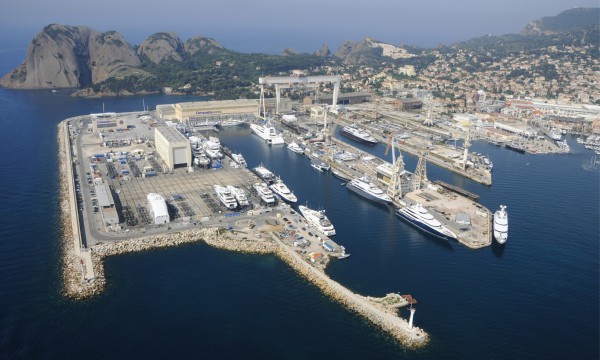Ten Questions
Mark Goddard Watts’ journey from hardware mogul to sailboat owner to industry investor.…
Mark Goddard Watts’ journey from hardware mogul to sailboat owner to industry investor.
1.Tell us about your background in business.
It is really centred around retail. We had a family business called Screwfix that we built up and sold to B&Q. After that we started Toolstation, which is very similar, and was sold to Travis Perkins in 2012. These two pretty much dominate the hardware supply market. I’m still in partnership with Travis Perkins on Toolstation Europe based in Holland, which is where I live now.
2. So, you’re not strictly from a yachting background. When did that change?
I first met Ben [Mennem, a co-founder of Compositeworks] back in 2002 and we talked a lot about building a sailing boat. Finally, Compositeworks built the little 45ft day sailor, called Dark Ice, and we launched her in 2005. We’ve taken part in Les Voiles de St-Tropez with her every year for 10 years. She’s a great, fast boat and I still have her now.
3. Did this influence your decision to invest in Compositeworks?
That definitely got me interested in the yard and what was going on there; I just thought it was a really exciting industry. A couple of years ago the opportunity came up to be a shareholder and get involved. It’s a great time for it because the whole industry is pumping out new boats but there are very few places to get them fixed. There are only a few companies people can trust with their multi-million-pound superyacht.
4. What made you confident that it was a sound investment?
When I look at investing in companies I look at barriers to entry. If everyone else can do the same thing there’s no point, but they don’t make yards and facilities like Compositeworks’ anymore, so that’s where the real value lies and we’ve got so much work.
5. The shipyard sector has historically been less appealing to investors. Why do you think this is?
The shipyard sector has historically been less appealing to investors because it’s a bit risky –people more often invest in marinas – but it’s a growing market. These boats are not going away and as they get older and change hands, more work comes in.
6. What has surprised you about the industry?
I think it’s interesting that given the end customers are so wealthy and products are so expensive, there doesn’t seem to be any sector of the industry that makes a lot of money. Occasionally, you’ll get an individual broker who does really well, but then they’ll go through a phase of doing badly. Similarly, for a period shipyards do really well, then nothing happens for a while and they do really badly. It makes me think it’s often lead by passion rather than profits.
7. What challenges do you encounter in the refit business?
Refit is a hard business as people don’t plan ahead. If you have a five-year survey – you pretty much know when that’s going to be – but it doesn’t get booked in. For example, we’re working on 70 or 80 projects this year, but so far for next year we have one booked in. Owners don’t want to commit to not having their boat for a period of time and nobody wants to give the owner the bad news that it’s time for the survey. It’s difficult to take the boat offline for four months.
8. What is being done to overcome this?
Yacht management companies are gradually coming in and making things more professional – that can only be good for the industry. Hopefully they will start laying out the process and pointing out that it can be a lot cheaper if they book ahead. There’s more room for negotiation if things are booked in early; the savings would be huge. Our medium-term plan is to try to get boats to plan when they are coming in.
9. Why do you think some management companies have a bad name among owners?
They are in the firing line because all they do is deliver bad news. People think they can get a better service elsewhere so they’ll try three or four other companies before they realise there was nothing wrong with the first one. That this is just how it is.
10. There has been talk about shipyards offering longer warranties. What are your thoughts on this?
When you spend so much money on something it’s shocking that you don’t get a warranty for longer than a year, but on the other hand a lot on board is custom-made, so they are essentially prototypes. Once one shipyard offers a long-term warranty, the rest will have to follow, it’s like any industry. Personally, I don’t think it’s a selling point – it can be negotiated on the quiet anyway. Another thing to consider is that some boats are beautifully looked after and some of them are kept in an awful condition, and that has a huge influence on whether things will start going wrong. It’s a tricky issue.
NEW: Sign up for SuperyachtNewsweek!
Get the latest weekly news, in-depth reports, intelligence, and strategic insights, delivered directly from The Superyacht Group's editors and market analysts.
Stay at the forefront of the superyacht industry with SuperyachtNewsweek
Click here to become part of The Superyacht Group community, and join us in our mission to make this industry accessible to all, and prosperous for the long-term. We are offering access to the superyacht industry’s most comprehensive and longstanding archive of business-critical information, as well as a comprehensive, real-time superyacht fleet database, for just £10 per month, because we are One Industry with One Mission. Sign up here.
NEW: Sign up for
SuperyachtNewsweek!
Get the latest weekly news, in-depth reports, intelligence, and strategic insights, delivered directly from The Superyacht Group's editors and market analysts.
Stay at the forefront of the superyacht industry with SuperyachtNewsweek




